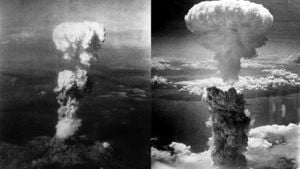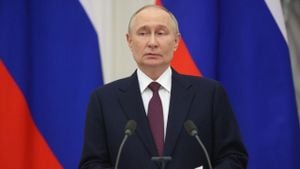Ukrainian President Volodymyr Zelensky recently suggested a dramatic shift in the strategy for peace amid the continuing conflict with Russia. During an exclusive interview with Sky News, he indicated the possibility of ending the "hot phase" of the war if NATO extends its protective umbrella to the territories currently under Ukrainian control.
On November 29, 2024, Zelensky articulated his stance by stating, "If we want to stop the hot phase of the war, we need to take under the NATO umbrella the territory of Ukraine we have under our control. We need to do it fast. And then on the occupied territory, Ukraine can get them back diplomatically.” These comments reflect a notable shift from his steadfast position of reclaiming all Ukrainian territory, including regions currently occupied by Russia.
Throughout the interview, the president emphasized the urgency of NATO support, proclaiming, "We have to immediately cover the part of Ukraine remaining under Kyiv's control, otherwise, [Russian President Vladimir] Putin will come back" for more territory. This plea stems from his belief, echoed by many international allies, of NATO membership being pivotal for Ukraine's security against future Russian advances.
Zelensky's remarks came on the heels of the election of Donald Trump as president, who has previously made comments about potentially re-evaluated U.S. policy toward Ukraine, including suggestions of ceding territory to Russia for peace negotiations. Zelensky noted the necessity of cooperating with Trump and highlighted the importance of direct communication. “We have to work with the new president to have the biggest supporter possible,” he said.
This approach puts Zelensky at odds with Trump’s administration's historical stance, which offered mixed support for Ukraine’s NATO aspirations. Trump himself has vowed to resolve the war swiftly and proposed ideas related to ceding territory as part of the peace process. Reports have suggested Trump’s upcoming approach may prioritize negotiations on territorial concessions, potentially shifting the balance of power.
Despite this new openness, Zelensky has been clear – the integration of NATO membership must recognize Ukraine’s internationally recognized borders. “You can’t give [an] invitation to just one part of the country,” he said, adding it would otherwise imply recognition of Russian claims over occupied lands and undermine Ukraine’s sovereignty. Currently, territories including Donetsk, Luhansk, Kherson, and Zaporizhzhia are partially controlled by Russian troops, and Zelensky has assertively maintained Russia must not receive any acknowledgment of sovereignty over these areas.
While discussing the issue, critics have pointed out the inherent risks of vague ceasefire proposals without clear guarantees against future aggression from Moscow. Previous ceasefires, perceived as temporary respites, have repeatedly faltered, with Russia launching offensives shortly afterward. Therefore, the concept of establishing NATO’s protective umbrella resonates with those yearning for stability.
Zelensky’s newest stance suggests the possibility of conceding temporarily held territories to international diplomatic negotiations, representing perhaps the first hint of flexibility from Ukraine's leadership on land disputes. He stated it was not permitted under the Ukrainian Constitution to cede territory without the consent of the local populace, maintaining constitutional integrity.
This marks the first time Zelensky has hinted at accepting some form of territorial negotiation; until now, he had been unwavering about reclaiming every inch of the homeland. "I want to share ideas and hear ideas [from Trump] about how to reach peace without risking our future,” he stated, emphasizing dialogue over hostility.
The backdrop of Zelensky's comments includes the grim reality of the war's toll on Ukraine. Russian forces have consolidated control over approximately twenty percent of Ukrainian territory. The president’s shifting discourse may be shaped by discussions among Western allies, particularly those weighing the feasibility of Ukraine’s NATO membership against regional stability dynamics.
His pivot could be interpreted as both recognition of the changing political scene with the arrival of Trump and the stark realities of the battlefield, where Russia has made strategic gains, particularly in Eastern Ukraine. Key areas previously considered strongholds of Ukrainian defense are now under increasing threat as the conflict drags on.
Zelensky's statement, laden with caution, does not guarantee peace but rather opens the door to discussions historically seen as undesirable. The possibility of NATO writing invitations could act as both a deterrent and motivator for renewed discussions, should proper mechanisms ensuring Ukrainian security be established. Only time will tell how these proposals will be received by NATO allies and how Russia will react to these changing tides of policy.
Throughout the war and its changing strategies, one thing remains clear: Ukraine's sovereignty and territorial integrity remain at the heart of the conflict. President Zelensky’s administration continues to adapt its approach amid pressures from both allies and its adversary, aspiring to balance diplomacy with the reality of war.
The plight of the Ukrainian people, resilient against the harsh conditions of conflict, has galvanized international support, securing humanitarian and military aid from the West. But as the war pushes on, with lives at stake, the necessity of finding long-term solutions grows ever more pressing.
Zelensky has voiced hope for peace within the next year, provided allies remain steadfast and united. With time being of the essence, his recent oval offers could ignite new discussions around NATO’s role, activating pathways to potentially transformative peace negotiations.
“Peace will not be simple, but it can happen,” he stated, stuck between the deep-rooted ethos of his nation now facing the trials of war and the uncertain path of negotiations.
Discussions of where to go from here remain as fraught as ever. The advice is straightforward: engage, communicate, but remain vigilant against the shadows of history looming over the present. Only then might Ukraine navigate the throes of conflict toward lasting peace.



